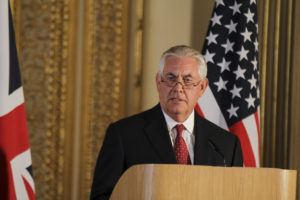Did British Security Services Drive ‘Jihadi John’ to Join Islamic State?
Documented evidence suggests the United Kingdom's MI5 drove a young Muslim man to the brink of madness. Screen Shot / YouTube
Screen Shot / YouTube
By Max BlumenthalThis piece originally ran on AlterNet.
In May 2009, the London-based human rights group Cage UK received a panicked phone call from a young man who had just been interrogated by the British security agency MI5. He had just returned from a trip to Tanzania when he was accosted by an MI5 agent who accused him of seeking to travel to Somalia to fight with Al-Shabab, a radical Islamist group waging a civil war against the country’s Western-backed government.
“He asked me, What do you think of 7/7?” the young man recalled, referring to the coordinated suicide bombing attacks that struck London on July 7, 2005. “I said, man, innocent people have died. You know, this is extremism!”
Next, the MI5 agent asked for his opinion of the US invasion of Afghanistan. The man replied that he opposed it on the grounds that innocent people were killed. It was a common view not only among British Muslims, but among supporters of the UK’s Labor Party in general.
“Then he starts telling me, What did you think of 9/11?” the man continued, with anguish rising in his voice. “I told him, this is a wrong thing. What happened was wrong! What do you want me to say? If I had the opportunity to make those lives come back, I would make those lives come back. I think what happened was wrong!”
This month, the exasperated young man heard in those phone calls was exposed by the Washington Post as the masked ISIS executioner known as “Jihadi John.” Back in May 2009, he was a 21-year-old University of Westminster graduate from West London named Mohammed Emwazi. Over the course of the next four years, the MI5 hounded Emwazi, attempting to recruit him as a spy and threatening him with harsh punishment if he refused to collaborate. By the time Emwazi left the UK in 2013, he had blamed the security services for driving him to the brink of madness. He would emerge soon after as the world’s most notorious terrorist.
Asim Qureshi, a spokesman for CAGE who was approached by Emwazi in 2009 and documented his accounts of security service harassment, believes MI5 played a critical role in driving Emwazi into the hands of ISIS. “We have created here in the UK an environment in which the security agencies can act with impunity, can destroy the lives of young people, without any recourse to challenge them in an effective way,” Qureshi declared at a February 26 press conference in London where CAGE released its record of communications with Emwazi.
Five days later at CAGE’s office in West London, Qureshi explained to me, “We’ve never said it’s MI5 that’s solely responsible for his descent into violence. But MI5’s role is a contributing factor in making him want to leave the UK for Syria.”
“Why don’t you come work for us?”
Emwazi first appeared on the radar of the British security services when he embarked on a trip with a group of college friends to Tanzania in May 2009. The MI5 believed that Emwazi was on his way to joining Al-Shabab in Somalia at the time, even though he had landed in a country that did not share a border with it. Emwazi insisted he was planning a safari in Tanzania and even produced a return ticket to substantiate his claim.
He had managed to fly out of the UK without incident and was able to pass through Amsterdam, where he had spent two days, all while he and his friends were under careful MI5 surveillance. As soon as he arrived in Tanzania, Emwazi was detained by local authorities acting on directions from the MI5, then stripped to his underwear and held in a dark, mosquito-infested cell. Over the next 24 hours, he said strange men with guns periodically entered to cell to threaten him. Tanzanian authorities ultimately found nothing to prove Emwazi had plans to join Al-Shabab and deported him on the curious grounds of having exhibited drunken, belligerent behavior on the flight from Amsterdam.
When he returned to Amsterdam from Tanzania, Emwazi was greeted at the airport by an MI5 agent calling himself Nick. “[Nick] said that at the end of the day they had been following us and watching us closely,” Emwazi told CAGE UK. “I told him that it was news to me and I had no idea about it. He knew everything about me; where I lived, what I did, the people I hanged around with.”
Emwazi said Nick attempted to induce him into spying for the MI5: “Listen Mohammed: You’ve got the whole world in front of you; you’re 21 years old; you just finished uni —why don’t you work for us?”
Emwazi was adamant in his refusal, triggering an ominous warning from Nick: “You’re going to have a lot of trouble… You’re going to be known… you’re going to be followed… life will be harder for you.”
The MI5 had apparently attempted to blackmail Emwazi, offering him an escape from its ever-tightening dragnet on the condition that he spy for them. Though the British government never formally charged Emwazi with any offense, the MI5 interrogated his fiancee and her family in Kuwait, and gradually stripped him of his ability to travel or work outside the UK.
When he was denied a visa to return to Kuwait in July 2010, where he had been employed as a salesman for an IT company, Emwazi got back in touch with CAGE. He was despondent, telling Qureshi he felt like “a person imprisoned and controlled by security service men, stopping me from living my new life in my birthplace and country, Kuwait.”
In an email exchange he conducted soon afterward with British journalist Robert Verkaik, whom CAGE urged him to contact, Emwazi expressed suicidal fantasies: “Sometimes I feel like I’m a dead man walking, not fearing they may kill me. Rather, fearing that one day, I’ll take as many pills as I can so I can sleep for ever!! I just want to get away from these people!!!”
According to Qureshi, Emwazi remained determined to find a way out of his predicament despite his increasing bouts of anguish. “What I saw was persistence [from Emwazi] — persistence to keep using the system,” Qureshi told me. “I never saw him losing hope. He was making a constant effort, he was always coming up with new ideas. Can I try this? What about traveling to Kuwait with my mother? Having an old lady there might get the MI5 off my back.”
But nothing Emwazi did could release him from the security services’ grip. In early 2013, he was rejected without explanation from an English instruction program in Saudi Arabia even as several of his friends were accepted. Even when he legally changed his named that year to Mohamed al-Ayan on his father’s advice, he was rejected again for a visa to travel to Kuwait. A virtual prisoner in London, Emwazi disappeared without a trace in August 2013. Qureshi suspects he slipped out with a forged passport, but the British government has not explained how he escaped while under such intensive monitoring.
When Emwazi resurfaced soon after, it was as Jihadi John, the black-masked ISIS executioner wielding a dagger over bound Western hostages clad in orange, Guantanamo-style jumpsuits.
The Conveyor Belt
Hours after Emwazi was unmasked as Jihadi John, CAGE UK released a massive trove of documents relating to his treatment by the MI5. The dossier revealed sustained harassment, constant surveillance and regular interrogations, exposing before an international audience the pernicious role the security services have played within Britain’s Muslim community since the dawn of the “war on terror.”
CAGE’s documents revealed how the MI5 not only groomed extremists as collaborators, but how its methods actually propelled marginalized young men down the path of extremism. (Ironically, just before he condemned CAGE’s criticism of the MI5, Prime Minister Cameron ordered a new inquiry into the security agency’s harassment of investigation Michael Adebowale, the British Muslim who butchered the British soldier Lee Rigby as revenge for the military’s abuses in Iraq and Afghanistan).
Every possible explanation has been offered for Emwazi’s descent into violent jihadism, from a head injury he supposedly suffered in grade school to his enjoyment of the Goosebumps children’s books series to his love for violent computer games. None of these seemingly superficial explanations have been challenged.
The most widely accepted narrative of Emwazi’s radicalization has focused around an academically unproven theory churned out by British government-backed neoconservative think tanks like the Quilliam Foundation called the “conveyor belt.” According to this theory, young Muslims turn to violent Jihad as a result of radical political and religious ideological inculcation, not in reaction to government repression or the West’s involvement in the Middle East. Incorporated by the British government into its Prevent counter-terrorism strategy, the “conveyor belt” theory has been leveraged to campaign for de facto loyalty oaths for new immigrants and intensified surveillance of Muslim political and civic leadership. Those who challenge the theory can expect to be labeled extremists and terror sympathizers by its promoters.
When CAGE’s Qureshi convened the press conference on the MI5’s harassment of Emwazi — a blatant rebuke of the politically convenient “conveyor belt” theory — his organization was bombarded with condemnations from Prime Minister David Cameron to London Mayor Boris Johnson, accused Qureshi of trading in “irrelevant nonsense.” Andrew Gilligan, a columnist for the right-wing British Telegraph, described CAGE as “extremists peddling lies to British Muslims to turn them into supporters of terror” and as “a terrorism advocacy group.” Sky News presenter Kay Burley joined the pile-on by opening an interview with CAGE spokesman Cerie Bullivant, who lived for two years under a control order under bogus charges of terrorism, with the question, “What level of harassment by the security services here in the United Kingdom justifies beheadings?”
While CAGE’s detractors hardly struggled to conjure up creative denunciations, they could not seem to counter the preponderance of evidence demonstrating the destructive role MI5 played in Emwazi’s radicalization. Even if Emwazi had planned to join Al-Shabab back in 2009, as the British government and its supporters maintain, MI5’s harassment of his fiancee, unrelenting threats and denial of his freedom of movement hardly helped to pull him back from the brink. If anything, they pushed him further into the margins of British society and closer to the bloody netherworld of ISIS, where his English language skills sent him rising through the ranks.
“Based on the person I knew, it comes as a shock to me that [Emwazi] would join up with ISIS,” Qureshi told me. “It might be a sense of belonging. He spent years feeling like he didn’t belong anywhere and now you have a group saying ahlan o sahlan [Arabic for “welcome”] and help us build the Islamic nation.”
Qureshi explained, “Some of our youth are extremely intoxicated by this idea. The idea that they will be welcomed somewhere and not judged on the basis of their religion is very intoxicating.”
The attacks on CAGE from the British government and supporters of its war on terror prompted banks to freeze the organization’s assets. Qureshi said a deluge of death threats forced him to move his family out of their home. But even as its staffers were painted as dupes for ISIS, the organization attempted a dramatic intervention to stop ISIS from executing Alan Henning, a British Muslim convert taken hostage while he was performing relief work in Syria.
“We tried to create an environment where ISIS and their supporters had to question whether or not it was Islamically permissible to kill this man,” Qureshi explained. “And we believe our efforts behind the scenes led to the delay in his execution.”
Qureshi said he was devastated when CAGE’s efforts came up short. He described the moment that Jihadi John appeared on television screens across the world with a dagger to Henning’s neck as one of the worst days of his professional career. “People vilified me for getting upset in the press conference [about Emwazi and the MI5],” Qureshi said. “I was getting upset that this kind, gentle man I once knew was capable of killing someone like Alan Henning.”
While the mask has been lifted on Henning’s executioner, the security services that attempted to recruit Emwazi maintain cover from the British government and an obeisant national media. Important questions remain unanswered, such as why MI5 failed to reveal Jihadi John’s real identity when the FBI said it knew who he was back in September 2014. But official accountability has been elusive.
As attempts to explore the state’s role in driving radicalization are shut down with demagogic denunciations, the government’s counter-terror strategy grows more draconian. In an apparent reaction to Emwazi’s identification as Jihadi John, the British Home Office has drawn up a proposal to cut social benefits to anyone who fails to learn proper English or develop “British values.”
“We need to stand up and be more assertive in promoting our values and challenging the extremists who fundamentally oppose them,” the document read. “This will include explaining our foreign policy [and] promoting mainstream voices supporting the quiet majority in all communities who oppose extremism.”
Your support matters…Independent journalism is under threat and overshadowed by heavily funded mainstream media.
You can help level the playing field. Become a member.
Your tax-deductible contribution keeps us digging beneath the headlines to give you thought-provoking, investigative reporting and analysis that unearths what's really happening- without compromise.
Give today to support our courageous, independent journalists.






You need to be a supporter to comment.
There are currently no responses to this article.
Be the first to respond.